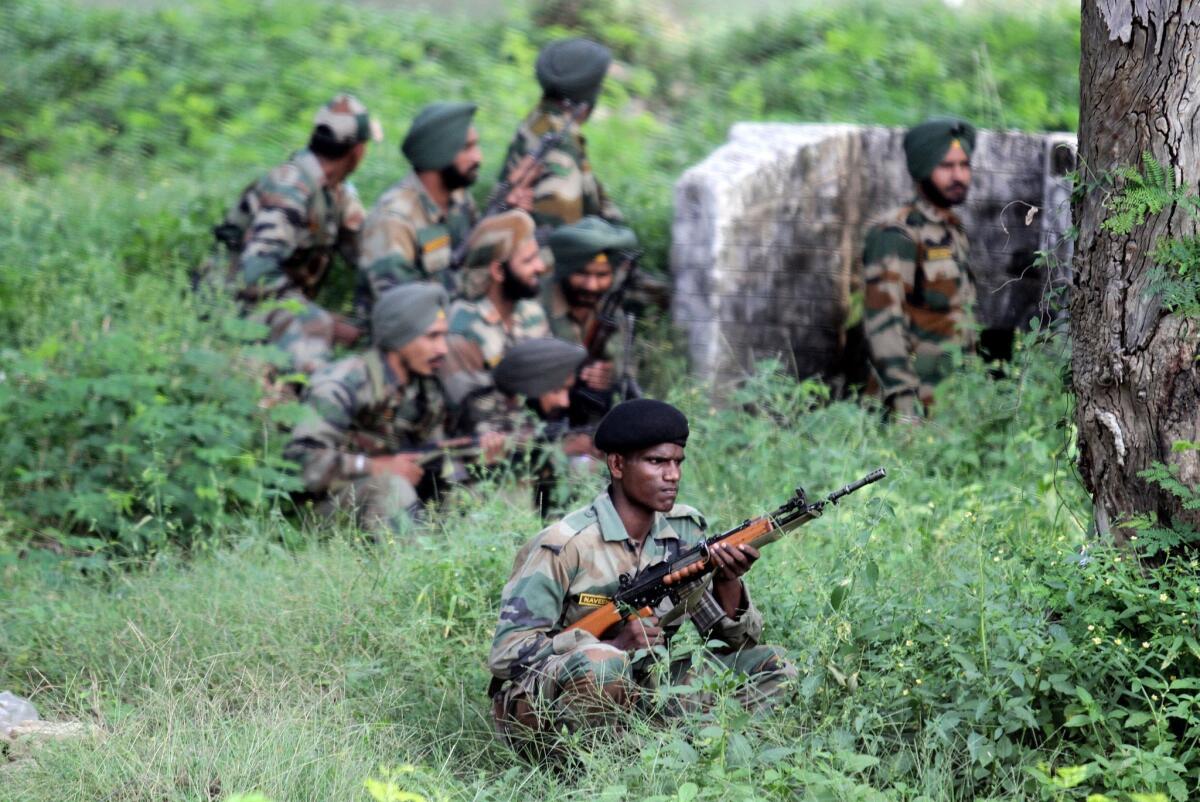Ahead of India-Pakistan talks, 12 die in militant attack in Kashmir

- Share via
MATHURA, India -- A brazen early-morning attack on the Indian side of disputed Kashmir reportedly killed 12 people, including three teenaged militants, Thursday, just days before the Indian and Pakistani leaders were scheduled to meet in New York.
The attack appeared to follow a long-established pattern, with extremists attempting to derail any steps toward rapprochement between the wary neighbors, analysts from both countries said.
A relatively unknown group that identified itself as the Shohada Brigade claimed responsibility for the attack in a call to India’s state-run Press Trust of India news agency. Mention of the group first surfaced in September when a threat was issued under its name against a classical-music concert, featuring conductor Zubin Mehta, in Indian-controlled Kashmir.
Thursday’s attack reportedly started around 6:45 a.m. local time when three militants dressed in army fatigues arrived in a tuk-tuk, or motorized rickshaw, at the Hira Nagar police station, located in India’s northern Jammu and Kashmir state a few miles from the de facto border with Pakistan.
Police said the gunmen were between 16 and 19 years old.
Surprising officers during a shift change, the three stormed the station with grenades and automatic weapons, reportedly killing four policemen and a civilian.
Media reports said the militants then commandeered a truck, killing an assistant and forcing the driver to accompany them along a main highway to Samba in an adjoining district. There they reportedly got into a firefight with Indian troops outside an army camp before breaching the camp’s perimeter.
Television images showed a tank at the army camp maneuvering into position as a helicopter hovered overhead. Other video showed security officers firing from just outside the camp’s walls as wounded men were taken away.
In a protracted battle lasting much of the day, reports said, the insurgents killed an officer and two soldiers before they were killed.
Omar Abdullah, Jammu and Kashmir’s chief minister, said it would be a shame if planned talks Sunday between Indian Prime Minister Manmohan Singh and Pakistani Prime Minister Nawaz Sharif on the sidelines of the U.N. General Assembly were canceled because of this attack.
“It would be grave injustice to those who have been killed,” he told reporters, adding that he believed that the attackers had crossed over from Pakistan-controlled territory.
Both leaders personally want better relations, analysts said, but face significant political constraints. Sharif has longstanding links to hard-line clerics, including those close to the Jamaat-ud-Dawa Islamist group opposing closer links, some said, while Singh’s ruling Congress Party is vulnerable to opposition accusations that it’s weak and ineffective.
“Personally, Sharif is in favor of peace, but I don’t know that he will make that his political agenda,” said Radha Kumar, director-general of the Delhi Policy Group, a think tank. “And India wants peace, but I am appalled by the levels of immaturity the opposition shows when it comes to peace talks with Pakistan.”
India, where voters go to the polls early next year, is already in election mode, and within hours of Thursday’s attack the opposition Bharatiya Janata Party slammed the government for even considering a meeting with Pakistan’s prime minister.
Talks and terrorism aren’t compatible, it said, directly blaming elements close to Pakistan’s powerful military for the attack. “What is the point of taking to a [Pakistani prime minister] who has no control over his army?” said opposition lawmaker Yashwant Sinha.
Though no significant breakthrough was expected out of the Singh-Sharif meeting, that fact that it was even taking place sends a positive signal to both countries, analysts said, while canceling it reverses hope of modest progress anytime soon. Two of three wars fought between the two countries since their independence in 1947 have been over Muslim-majority Kashmir.
India, which has battled a separatist insurgency in its part of Kashmir since 1989, has repeatedly accused Pakistan’s military establishment of supporting militants fighting Indian rule. This is a tired accusation, counter Pakistani security analysts, which only feeds the distrust that militants hope to fan.
“The army, [intelligence agencies] and political leadership are on the same page,” in supporting better India-Pakistani relations, said Mehmood Shah, a Peshawar-based analyst and former army officer. “Whoever did this attack is no friend of India’s and no friend of Pakistan’s.”
Other recent militant attacks in Jammu and Kashmir include the killing of eight soldiers at Hyderpora in June and a March suicide strike at a paramilitary camp in Srinigar that killed five paramilitary personnel and three insurgents.
“We have equally emotional publics on both sides,” Shah said. “But the political leaders must try and keep things in check. We’ve seen many incidents like this before.”
[For the Record, 11:05 a.m. PDT Sept. 26: An earlier version of this post stated that officials had reduced the death toll in the attack to nine. The toll at that point remained at 12.]
ALSO:
Kenya mall attack unlikely to alter U.S. approach to Shabab
War crimes court upholds 50-year sentence for Charles Taylor
Iranians eager for change disappointed Rouhani didn’t offer more
Special correspondent Sharma reported from Mathura and staff writer Magnier reported from Islamabad, Pakistan.
More to Read
Sign up for Essential California
The most important California stories and recommendations in your inbox every morning.
You may occasionally receive promotional content from the Los Angeles Times.










